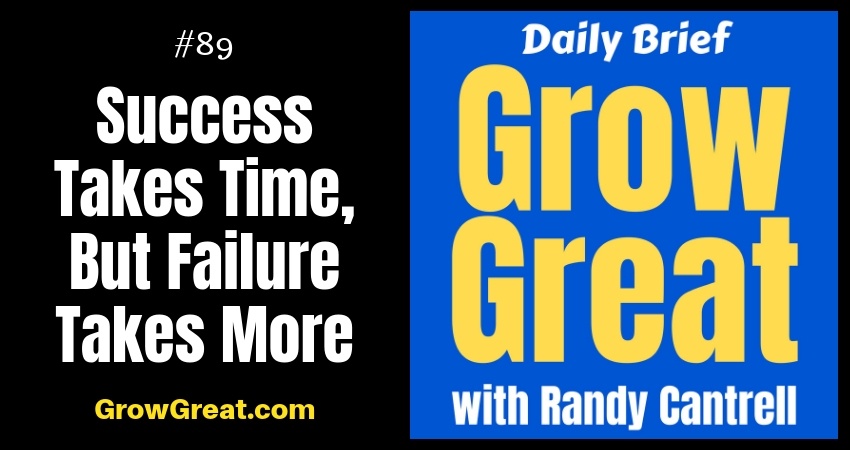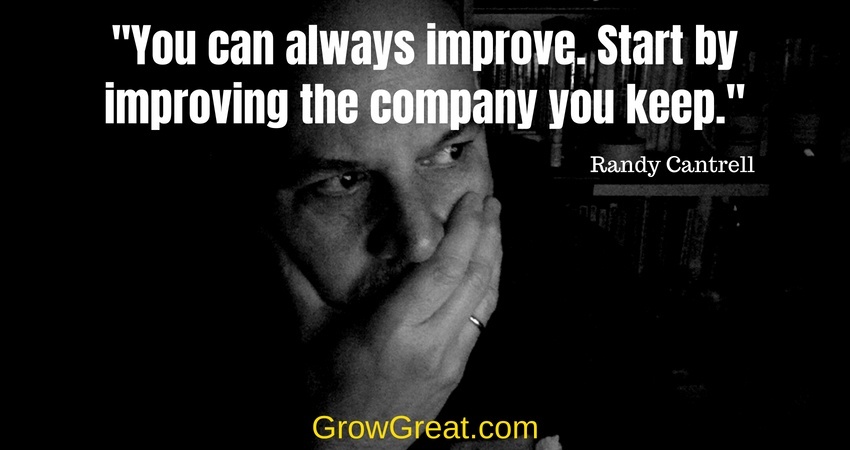Success Takes Time, But Failure Takes More – Grow Great Daily Brief #89 – October 24, 2018
Podcast: Play in new window | Download (Duration: 8:16 — 8.7MB)
Subscribe: Apple Podcasts | Spotify | RSS | More

Work smarter, not harder. Or longer.
Bull.
It’s bull because you’re competing against people who are working smarter, harder and longer.
It’s also bull because you’re not on control of your innate talents, but you’re in complete control of how smart you become, how hard you work and how much time you devote to it.
Time invested is critical because it takes time to figure it out. Then it takes more time to really figure it out because things don’t remain the same. In our success, we often get tripped up. Causing us to have to figure it out again. And again.
Get smarter.
Devote more time and effort to learning. Knowledge is a big part of figuring it out. Idiots can’t figure it out. You’ve got to put in the work to be smart. You can’t ever stop either because you’ll never be too smart.
Work harder.
Not fake effort, but real effort. You can walk around the block. Or you can jog. Or you can sprint 30 feet, then walk 15 and repeat it. People enjoy walking but characterizing it like the sprinting. Most of us tend to feel like we’re working harder than we really are. Don’t fool yourself. Put in the effort to match your ambition. And I’m not going to encourage you to lower your efforts to match pathetically low ambitions. Come on, the website and podcast are titled, “Grow great!”
Work longer.
Give it the time it deserves. Because it’s worth it. And there’s the reality that time is going to pass all of us at the same rate of 24 hours daily. The next few hours are going to pass no matter what you do. You may as well invest that time in doing the work to figure it out. It’s not about simply spending more time. Any dolt can sit in a chair hours longer than others, but get nothing done. It’s about what you do with those hours…all toward accelerating your ability to figure it out.
Success takes time.
I live in Dallas/Ft. Worth. This is a pro sports town with every major sport represented. Dallas Cowboys. Dallas Mavericks. Texas Rangers. Dallas Stars. These teams are comprised of wealthy players able to compete at the highest levels of their sport. Yet, the Cowboys were last champions in 1996. The Stars in 1999. The Mavericks in 2011. The Rangers still haven’t achieved a championship even though they lost 2 World Series in 2010 and 2011. Even if you’re elite figuring it out takes time. Sometimes it takes a very long time.
Professional sports is entertainment. That gives the industry a unique ability to turn a profit without winning the sport. Even losing teams make money because most teams do lose. Success has many fronts and financial is just one of them. Admittedly, the chief one because if you don’t make a profit you can’t keep the doors open.
You have to see it over and over.
This is the time of year when I’m willing to watch Major League Baseball. Otherwise, I hate baseball. Too slow. Too long. Too boring. But I appreciate the tactics and skill. And I appreciate how hitters talk about how they’re able to adjust to pitchers during a series because it helps when you’ve seen a pitcher multiple times. Pitches that first fooled a hitter may not fool them at all later. Players make adjustments based on experience and learning.
How else can you explain a multi-million dollar NFL quarterback with unquestioned ability throwing more interceptions than touchdowns? Because when they enter the league they’re up against elite defenses coupled with world-class speed. Mistakes cost you. But pay close attention to these quarterbacks over the period of 3-5 years. Unless they’ve got no supporting cast – namely, a good offensive line to protect them – they figure it out, but it takes seeing it 16 games, then another 16 games and maybe then another 16 games. The more complex it is, the longer it takes. The fewer repetitions available, the longer it takes.
It’s why minor league systems exist. One reason. Players at the major league level of baseball or hockey get called “up” (to the majors) or “sent down” (to the minors) sometimes because they need more repetition. The management knows that by playing more games they’re giving the player more time to figure it out.
If you don’t want to put in the time, that’s up to you. Go ahead. Embrace the mantra, “Work smarter, not harder!” It’s a contradiction. The people working smarter, are working harder because harder is smarter. Success isn’t guaranteed. No matter what you do. But consider the alternative…
Not working harder is sure to fail, then what are you left with? Failure will take away a lot more than time. It’ll rob you of your self-respect. Fill you with regret. Fuel bitterness and envy. And guilt. Failure demands a higher price than success, but it’s disguised as something other than a lack of effort. It’s too often cloaked in feeling sorry for ourselves. Wanting others to feel bad for us.
Trial and error. Error isn’t failure.
Success requires trial and error. In the moment, the error is failure. It didn’t work. But it’s only temporary so it doesn’t count as failure. It counts as learning. Big difference.
Failure is quitting, or not putting in the work. That teaches us nothing! There is no learning. And that’s a waste of everything.
So be patient. Put in the work. Stick with it. Learn. Keep learning. Figure it out.
Be well. Do good. Grow great!







